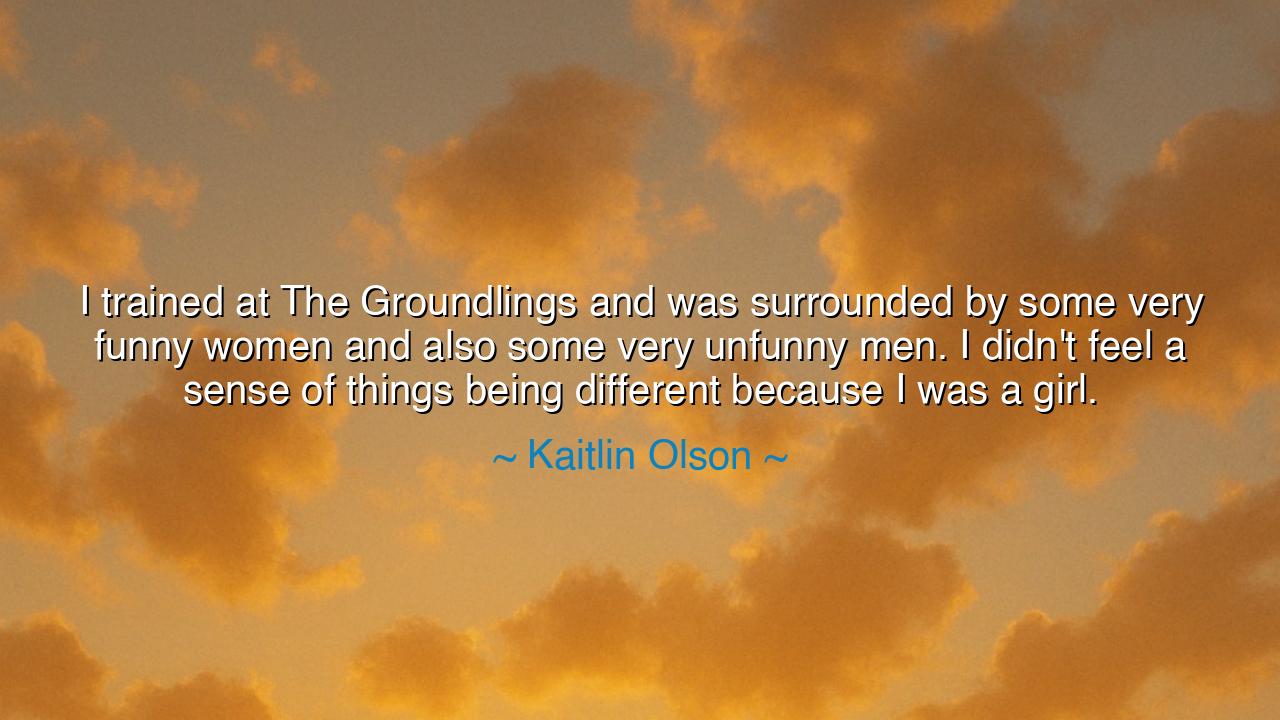
I trained at The Groundlings and was surrounded by some very
I trained at The Groundlings and was surrounded by some very funny women and also some very unfunny men. I didn't feel a sense of things being different because I was a girl.






“I trained at The Groundlings and was surrounded by some very funny women and also some very unfunny men. I didn’t feel a sense of things being different because I was a girl.” — so spoke Kaitlin Olson, a warrior of comedy, whose wit shines as fiercely as her courage. In this reflection, she does not merely recount her training; she speaks of equality, of the balance between talent and truth, and of the triumph of merit over assumption. Her words are calm, yet beneath their serenity lies the strength of one who has walked among both laughter and limitation — and refused to be defined by either.
At its heart, this quote is a declaration of freedom: the freedom to create without the burden of comparison, to stand among others as an equal not because of identity, but because of excellence. The ancient philosophers would have recognized in Olson’s spirit the same courage found in the heroes of their myths. For she reminds us that greatness knows no gender, that the Muses of comedy and art bestow their gifts not by lineage or form, but by passion and perseverance. In her experience at The Groundlings, that temple of improvisation and performance, she saw truth laid bare — that talent is sovereign, and all who bear it share in its power.
When she says she was surrounded by “funny women” and “unfunny men,” her words ring with both humor and justice. It is a gentle reversal of centuries of assumption, a playful correction to a world that too often misjudged who was permitted to be clever, bold, or ridiculous. The ancients, too, had their biases — the stage of Athens, though rich in comedy, denied its women the right to perform. Yet history shows that laughter itself cannot be confined. In every age, those who were underestimated found strength in their art. Olson’s observation is not an insult to men, but a revelation of truth: that humor, like any great gift, belongs to the human, not the gendered.
Consider the story of Hypatia of Alexandria, the philosopher and mathematician of the ancient world. She, too, lived surrounded by men who doubted her intellect — yet she surpassed them not through rebellion alone, but through mastery. She proved that wisdom has no gender, that ability is its own defense. Kaitlin Olson’s journey echoes this same spirit in the realm of comedy. Where others might have sought to prove themselves against prejudice, she simply created, performed, and excelled — until her work itself became the argument, irrefutable and radiant.
There is a deeper humility in her final words: “I didn’t feel a sense of things being different because I was a girl.” This is not naïveté; it is a statement of vision. Olson chose not to let the world’s divisions define her experience. The ancients would call this ataraxia — the serene state of one who remains undisturbed by the noise of judgment. To her, the stage was not a battlefield but a canvas, and laughter the great equalizer. She reminds us that equality is not only achieved by demanding recognition, but by living as though one already possesses it — by standing in one’s craft without apology or expectation.
Yet her words also carry a challenge for all who hear them. They urge us to look beyond appearances, beyond titles, beyond the illusions of category. The funny woman and the unfunny man exist not as opposites but as symbols — of how often talent defies stereotype, and how art flourishes only where merit is honored above bias. The ancient dramatists taught that the gods themselves laughed at human folly — but they also rewarded those who were brave enough to defy convention. Olson, in her way, joins this lineage of those who create fearlessly, whose laughter becomes a form of truth-telling.
So let this teaching be passed down: Judge not the vessel, but the voice. In your work, your art, your friendships, see not the labels the world has written, but the light that burns within each soul. Like Kaitlin Olson, find your worth not in the eyes of others, but in the strength of your craft. Refuse to be diminished by expectation or elevated by flattery. Stand, as she stood, among all kinds of people — the gifted and the graceless alike — and let your work speak. For when you live and create without fear of difference, you walk in the company of the ancients — free, unshaken, and full of laughter that belongs to no one, and to everyone.






AAdministratorAdministrator
Welcome, honored guests. Please leave a comment, we will respond soon